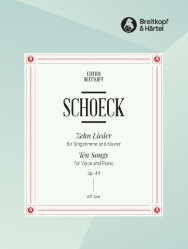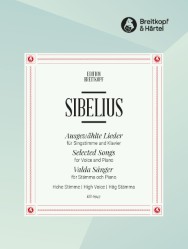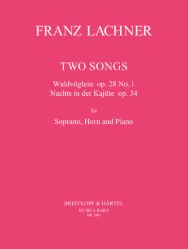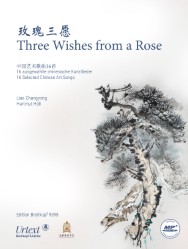Une Bouche Aimée (Solo Tuning)
Solo Tuning
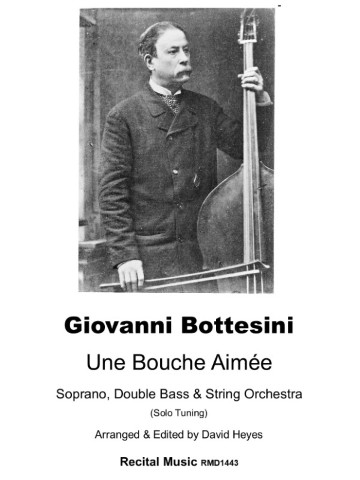
Page ? of ?
Composer: Bottesini, Giovanni
Arranger: David Heyes
Instrumentation: Soprano, Double Bass and String Orchestra
Publisher:
| Product Code: | RMD1443 |
| Publishers Number: | RMD1443 |
| Language: | English |
| Condition: | New |
Bottesini’s early musical education was provided by his father, an accomplished clarinetist and composer. He began playing timpani with the Teatro Sociale in Crema before the age of eleven and later studied violin with Carlo Cogliati1. His father sought a place for him at the Milan Conservatory in 1835, and Bottesini prepared a successful audition for the double bass scholarship in a matter of weeks.
After leaving the conservatory in 1839, Bottesini embarked on a globe-trotting career as a double bass virtuoso. He made his first appearance in England in 1849 and enjoyed great popularity for many years due to his extraordinary skill as a performer1. Bottesini was also known throughout Europe as a conductor and directed the first performance of Verdi’s Aida at Cairo in 1871.
Giovanni Bottesini, often heralded as the “Paganini of the Double Bass,” was a multifaceted musician whose career as a virtuoso double bassist, composer, and conductor left an indelible mark on the Romantic music era. Born on December 22, 1821, in Crema, Lombardy, Italy, Bottesini’s early immersion in music was facilitated by his father, a clarinetist and composer who introduced him to the world of sound long before he learned to read notes. His youthful exposure to musical performance in local theaters and family gatherings provided the foundation for what would become a lifelong passion and career.
Initially studying the violin with Carlo Cogliati, Bottesini’s musical journey took an unexpected turn when his family, constrained by financial limitations, sought a scholarship at the Milan Conservatory in 1835. With scholarships available only for the double bass and bassoon, he devoted himself to mastering the double bass in mere weeks. His swift and impressive adaptation to the instrument secured him a scholarship and a prize for solo performance. This early achievement not only launched his career as a double bass virtuoso but also laid the groundwork for the innovative techniques he would later develop and popularize.
Bottesini’s virtuosity on the double bass soon garnered him international acclaim. Adopting an approach reminiscent of virtuosos like Paganini on the violin, he transformed an instrument largely relegated to the background into a vehicle for dazzling solo expression. His extraordinary skill, highlighted by rigorous technical command and expressive nuance, earned him high praise across concert halls in Europe and America. Notably, Bottesini’s prized instrument—a double bass crafted by the renowned Carlo Giuseppe Testore—became almost a character in its own right, symbolizing the melding of craftsmanship and artistry that defined his performance style.
Alongside his career as an instrumentalist, Bottesini also pursued composition with a creative spirit that aligned with his performing genius. His first opera, Cristoforo Colombo, produced in Havana in 1847, marked his foray into the world of stage music. Over time, he composed several operatic works including L’Assedio di Firenze, Marion Delorme, Ali Babà, and Ero e Leandro. In addition to full-scale operas, his arrangements and fantasies on popular operatic themes—drawn from works like Lucia di Lammermoor and La sonnambula—remain staples for double bass soloists seeking to explore the instrument’s versatility and expressive capacity.
In addition to performing and composing, Bottesini carved out a significant reputation as a conductor. His conducting career flourished with appointments such as his tenure at the Théâtre des Italiens in Paris from 1855 to 1857. His success in this role led to further opportunities throughout Europe; he conducted productions in cities like Palermo and Barcelona, and his leadership was instrumental during a season of Italian opera at the Lyceum Theatre in London in 1871. One of the most notable moments of his conducting career was his collaboration with Giuseppe Verdi when he was chosen to conduct the premiere of Verdi’s Aida in Cairo—a testament to the esteem in which he was held by his contemporaries.
Bottesini’s legacy extends beyond his dazzling technical achievements and compositions. As an advocate for the double bass, he expanded its repertoire and potential, influencing subsequent generations of musicians who sought to explore the instrument’s unique voice. His ability to traverse the realms of performance, composition, and conducting exemplifies a musical intellect that was not confined by the boundaries of any one discipline. Today, Bottesini’s works continue to inspire double bass players and opera enthusiasts alike, serving as a bridge between the Romantic spirit and modern interpretations of classical music.
Bottesini’s contributions to music include numerous operas, sacred works, orchestral pieces, and works for the double bass. His fantasies on Lucia di Lammermoor, I puritani, Beatrice di Tenda, and especially La sonnambula are virtuosic tours de force that are still popular with those who are highly accomplished on the instrument.
He passed away on July 7, 1889, in Parma.
Une Bouche Aimée is originally by Charles Gounod (1818-1893) and is based on My Beloved Spake for soprano, violoncello obbligato, and piano. Composed in London…
The double bass employs the lyrical and sonorous solo register of the instrument, in music which has delighted audiences since this piece came to prominence in the 1980s. Bottesini’s manuscript is undated but it is likely that he met Gounod in the 1870s, then living in London, or heard the song and realised that it would transcribe beautifully for the double bass.
Une Bouche Aimée is also available in orchestral tuning and is successful as a stand-alone work or alongside Bottesini’s Tutto il Mondo Serra. The double bass part in the full score includes the original Bottesini bowings alongside an edited version by David Heyes.
Digital Download – PDF
Shipping costs: No shipping
R.R.P £12.00
Our Price: £10.20
You might also like
-
10 Lieder Op. 44
£26.35 -
15 Selected Songs
£28.05 -
2 Songs
£17.00 -
3 Wishes from a Rose
£28.90

